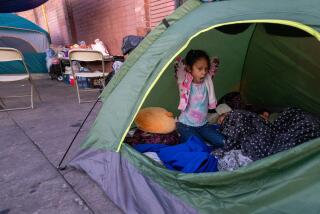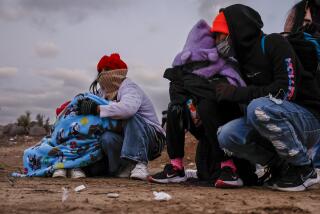Chicken pox and flu: Migrants are getting sick at the U.S.-Mexico border
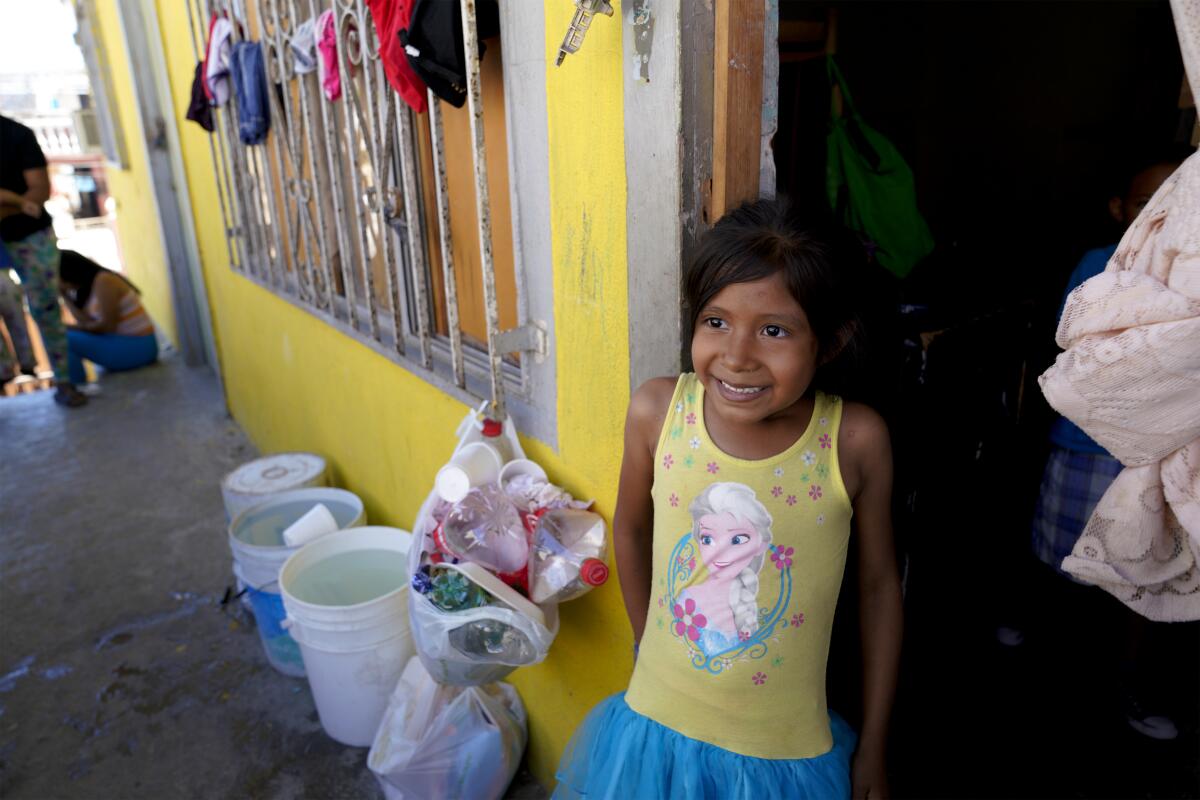
On her first day out of quarantine, 6-year-old Fernanda Martinez was ecstatic. She raced a mini-green quad up and down the hall outside the dark room where she spent four weeks separated from everyone because of a severe case of chicken pox.
Greeting all the other children at the Agape Mision Mundial shelter in Tijuana, Fernanda announced she was equally excited to see everyone.
Her scabs weren’t completely healed, but a doctor gave her the green light to finally leave the room where people have been quarantined with varicela, or chicken pox.
“She cried and cried and cried because she could not go around any of the other children,” said her mother, Jasmine Martinez, 34, of Honduras. “I was crying for her because it was so hard seeing her suffering.”
Martinez said after fleeing gangs, traveling a rough road from Honduras, spending about a week in U.S. detention and then being returned to Mexico, where she and her two children don’t know anyone, coming down with chicken pox in a crowded Tijuana shelter was the challenge that finally caused Fernanda to break down into tears.
Pastor Albert Rivera, who runs the Agape shelter, said at one point as many as 40 people were sick with the highly contagious virus that causes an itchy rash and small fluid-filled blisters. Around five remain in quarantine. Of the 225 sheltered at Agape, a total of 73 people are sick with other illnesses, he said.
Rivera said because the incubation period for chicken pox is 10 to 21 days, it’s unclear if migrants are getting sick in crowded conditions in U.S. detention or if they are arriving at the border from their home countries with the contagious illnesses.
What is clear is that illnesses typically spread very quickly among migrants in Tijuana shelters.
“Because they are all in such close quarters, once one person gets it, they all get it,” said Dr. Julie Sierra from UC San Diego Health. Sierra volunteers as a medical consultant to groups assisting migrants in Tijuana and has been volunteering in Baja California shelters on Saturdays.
Many of the illnesses she’s seen — including upper respiratory infections, scabies and stomach ailments — are typically minor, Sierra said, but they can be serious for pregnant women and people with compromised immune systems.
“If you’re in a situation where you’re not getting enough food or the right food and your body is strained and under stress ... you’re just going to be more susceptible to infections,” she said.
She also said because migrants come from different parts of the world, they may expose one another to unfamiliar illnesses.
“People from different countries are exposed to different illnesses through their life, so they build up different antibodies in their bodies,” Sierra said. “So, a virus or infection that one person might be able to resist, another person from a different part of the world might not have had the chance to build up antibodies to that particular illness.”
Hector Gutierrez, coordinator for migrant services for the incoming state government of Baja California, is working to bring enough medicine to all of the shelters.
“We are seeing a lot of cases of the flu,” he said. Gutierrez estimated about 10% of migrants in Baja California shelters are currently sick and about 2% have chicken pox.
Gutierrez said migrants are pushing their bodies to the limit to get from Central America to the U.S.-Mexico border in Baja California, which weakens their immune system. The climate also could be contributing to some people’s illnesses.
“Tijuana’s climate is very hard to adjust to,” Gutierrez said. “We have very cold nights and very hot days. So, especially if you come from a more tropical climate, they’re just not accustomed to it. Also, they are probably very tired from their journey. Their defense systems are already low and they aren’t getting the best nutrition.”
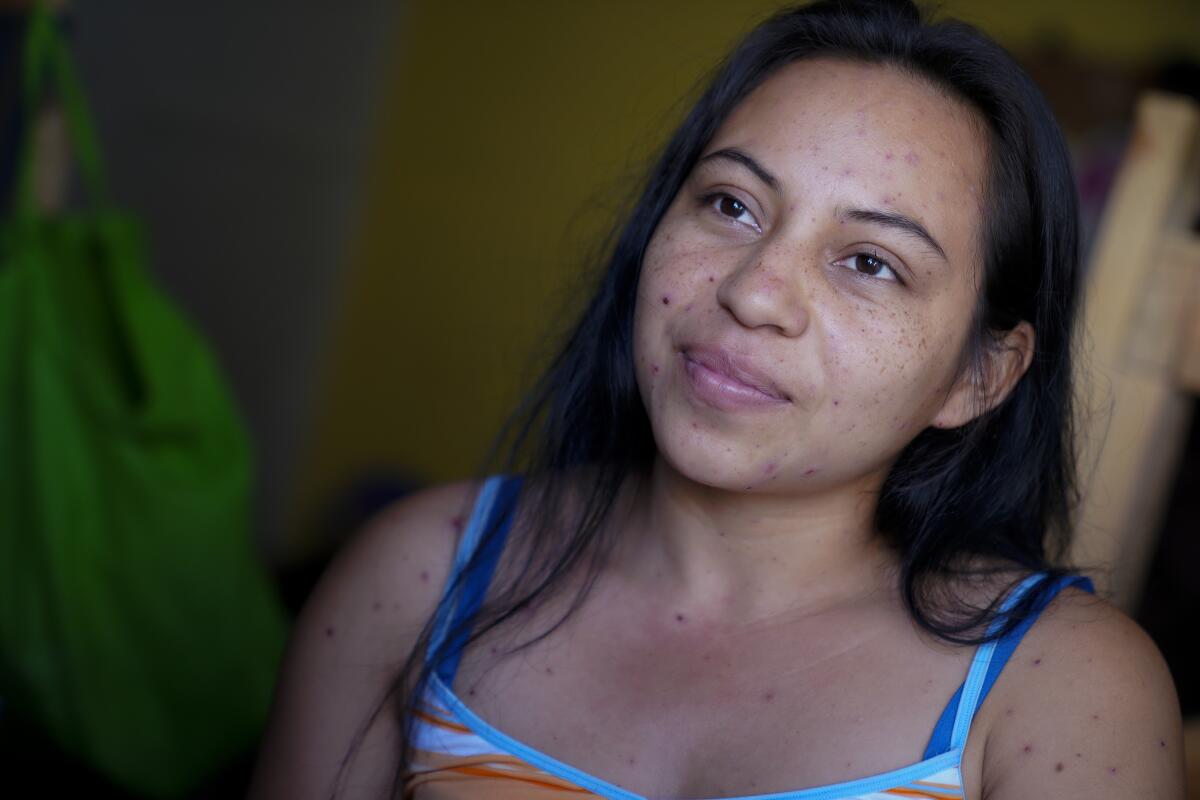
One woman from Guatemala, who did not want to give her name because she feared it could affect her immigration proceedings, said she had been waiting at the Agape shelter for two days for a doctor to come with more medicine to treat her itchy sores from chicken pox. She said the last time she received any treatment from a doctor had been five days prior.
A Baja California state representative told the San Diego Union-Tribune a doctor was coming to Agape with refills of medicine later that day.
The woman said she had recently crossed into the United States but was returned under the Migrant Protection Protocols, better known as the “Remain in Mexico” program. She said she didn’t think she could wait in Tijuana until her court date in November, but wasn’t sure if she was going to try to cross illegally back into the U.S. or move somewhere else in Mexico, after she gets better.
“I won’t be going back to Guatemala,” she said emphatically, but declined to say why. “I cannot go back there.”
The Remain in Mexico policy requires migrants to wait for their immigration hearings in Mexico rather than the United States.
Gutierrez , who works as a liaison between the newly elected governor and the migrant shelters, said the government has not seen such a severe outbreak of chicken pox in other shelters, but they are monitoring each one carefully.
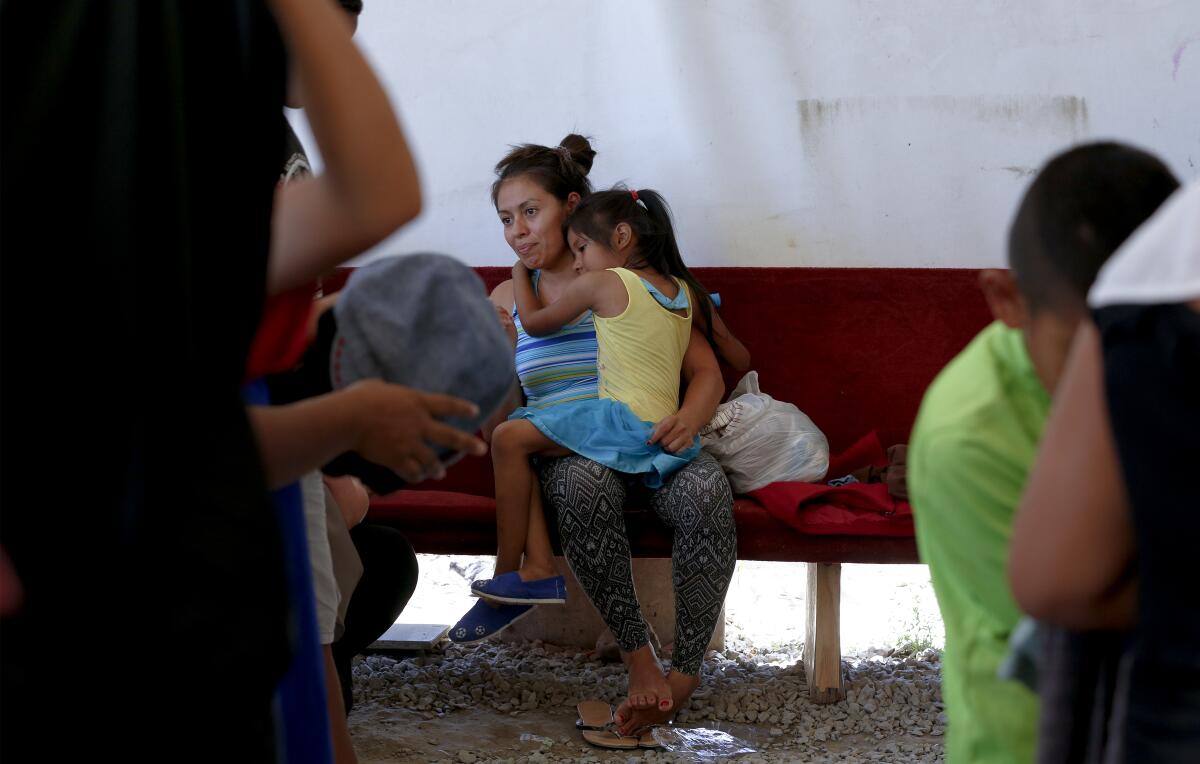
Shelters in Baja California are privately run, which makes it difficult to get an exact count of how many migrants are sick. The state representative said there was not a count of cases of chicken pox, tuberculosis or other illnesses across the state, but health institutions are regularly checking each shelter.
Sergio Tamai, who runs the Hotel Migrante in Mexicali and leads a coalition of shelters across the state, confirmed health authorities are visiting the shelters weekly.
Pastor Gustavo Banda of the Ambassadors of Jesus church, which operates a shelter in Tijuana, said many people returned under Remain in Mexico have been arriving from the United States very sick.
“Fortunately, we do not have the chicken pox, but the flu is always there because people return from the hieleras, but everything is under control because we always have doctors,” said Banda, who also confirmed state health authorities have been readily available.
Las hieleras or “the iceboxes” is a nickname for the frigid, cramped holding cells in U.S. Customs and Border Protection facilities.
A CBP spokesman for the San Diego sector said when migrants arrive sick at the border they are quarantined on site, medically evaluated and taken to a hospital if necessary. He said numbers were not immediately available for how many migrants have been treated for illnesses in recent weeks.
CBP Rio Grande Valley Sector Chief Rodolfo Karisch said agents take about 30 migrants a day to emergency rooms, according to the Texas Tribune.
Since the deaths of several children, CBP has faced criticism over how sick migrants are treated in U.S. custody.
“There are a lot of people that are traveling to the United States that are already ill and infirm. Many times, we won’t know about it — they’re not showing any signs of it,” Karisch said at a news conference this month. “We are seeing every infirmity that you can name, from mumps to [tuberculosis], scabies. You name it, our agents are seeing it.”
In the Agape shelter, the Department of Health in Baja California tested migrants for tuberculosis after a man crossed into the United States with the serious infectious disease that affects the lungs. He had stayed at the Agape shelter, he told U.S. officials, who passed the information on to Baja California authorities, Rivera said.
“He didn’t tell them he was sick when he crossed over because he didn’t think they would let him into the United States,” said Rivera, who said the manspent only one night at Agape.
A CBP spokesman said the agency does not return migrants based on their health status, but he said if a migrant has his or her immigration hearing on a day when they have an active contagious illness, that appointment would probably have to be rescheduled.
Marivelle Perez, who fled gangs in Honduras, said she was glad her 6-year-old daughter Marissa came down with influenza right when they were returned to Tijuana, months before their scheduled immigration hearing.
“I do not want to imagine waiting all these months here and then getting sick before our court date and having to wait many more months,” said Perez, who said she and her family have endured enough. “God will bless us with good health now.”
Gutierrez said the shelters in Tijuana are doing their best to care for people, including sick migrants, without receiving any public funds. The international community could help out by donating to shelters in Tijuana.
“There’s 15 to 20 shelters in Tijuana that are doing an excellent job, but they need more help,” Gutierrez said. “Right now, funds will not be available until the end of the year so there is a lot of need of that international help.”
More to Read
Start your day right
Sign up for Essential California for news, features and recommendations from the L.A. Times and beyond in your inbox six days a week.
You may occasionally receive promotional content from the Los Angeles Times.
